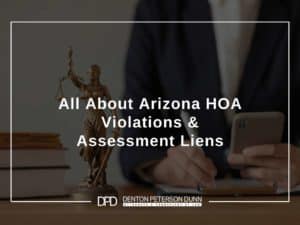
As you hunt for a new home, you’ll likely discover that many homes belong to a community with a homeowner’s association, or HOA. If you choose a home that belongs to an HOA, it’s important to make sure you understand and follow the regulations that are involved. Your Glendale business attorney answers common questions about HOAs and how you can avoid complications with violations and liens.
An HOA is an association of property owners who manage the community where a home is located. If you purchase a property governed by an HOA, membership is mandatory and will require regular payment of homeowner assessments, as well as adherence to specific rules, conditions, and restrictions. In exchange, you’ll enjoy the protection, maintenance, and preservation of your home through services such as groundskeeping, maintenance, and trash code enforcement. HOAs are designed to help protect the value of your property.
Each HOA will have its own requirements, but these are some of the most common violations.
HOAs promote curb appeal for the entire community, so it’s likely that yours will have rules about lawn maintenance, weeding, and unkept exteriors. Before making changes to your landscaping, check your HOA’s by laws about what kinds of trees and shrubs can be planted.
It’s common for HOAs to limit how many and what type of vehicles, such as RVs, boats, and commercial vehicles, can be parked on the property, as well as rules about designated parking areas.
For security and insurance reasons, HOAs usually have regulations about subletting homes. Check your bylaws and talk with your Scottsdale commercial real estate attorney if you are thinking about renting out your home.
An HOA may have rules against throwing certain items into community dumpsters or putting out trash cans too soon before the designated garbage collection time.
To keep up the appearance of the neighborhood, HOAs sometimes limit what types of equipment or storage structures can be on your property. For example, you may need permission to build a storage shed or be required to store bicycles indoors.
You may face restrictions about the number or breed of pets you can own and where they can be walked, along with leash and waste cleanup regulations.
Many people appreciate noise restrictions during certain hours. In an HOA, these rules may be more stringent than noise ordinances prescribed by the city.
Some HOA rules can be enforced by law enforcement because the regulations must comply with state and local laws and ordinances. As an example, police officers can enforce things like speed limits, pet leash laws, or noise ordinances because they are legal matters with the city or county. However, police typically will not enforce HOA rules related to other issues such as landscaping or paint color violations.
According to a Peoria business attorney, an HOA cannot force homeowners to sell their homes if they are refusing to follow HOA rules. But an HOA can impose reasonable fines for violations of the HOA terms. If fines are left unpaid, late fees can become costly, and eventually an HOA can file a lien against the home. This can happen even if a mortgage is owed on the home. If the situation becomes severe, the HOA can foreclose on the lien, which can be financially and socially disastrous for the homeowner.
It can be frustrating to receive a warning letter and/or fine from your HOA, especially if you didn’t realize there was a specific bylaw regarding the situation or if you disagree that you have violated an HOA rule. It’s best to deal with the situation right away. Contact your Tempe commercial real estate attorney if you need guidance or if things go awry. Some other tips for responding to an HOA violation notice include:
Living in an HOA isn’t the best choice for everyone, so do your homework and make sure you understand all of the rules before making an offer on a home.
Whether you are buying or selling residential property in Arizona, you need the experience of a skilled legal team to help with the complexities. The attorneys at Denton Peterson Dunn have what it takes to represent you accurately and assertively in all stages of real estate transactions. Avoid surprises and handle disputes effectively with a top rated attorney! Schedule your consultation today.
Brad Denton – Denton Peterson Dunn
Mesa Location
1930 N Arboleda #200
Mesa, AZ 85213
Office: 480-325-9900
Email: brad@dentonpeterson.com
Website: https://arizonabusinesslawyeraz.com
Scottsdale Location
7272 E Indian School Rd #540-132
Scottsdale, AZ 85251
Phone: 480-325-9919
Email: service@dentonpeterson.com
Website: https://arizonabusinesslawyeraz.com
Are you dealing with labor law violations regarding trade secrets? Consult with employment law experts…
Wondering how to protect trade secrets in litigation? Learn strategies for early identification, specificity, and…
Want to protect your business from liability and disputes? Learn effective contractual tools and legal…
Concerned about embezzlement in your business? Learn how to safeguard against theft, understand legal distinctions,…
How is remote work reshaping commercial real estate? Explore how businesses are adapting leasing strategies,…
Is your business ready for remote work? Learn the legal considerations & best practices for…